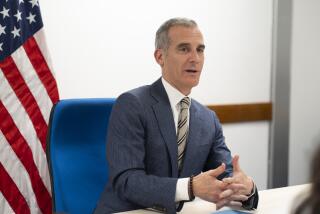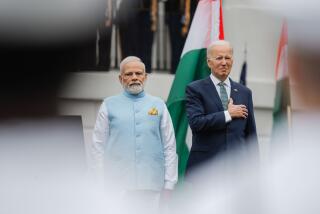Expatriates Play Key Role in India’s Economic Rise
- Share via
For many foreign officials and executives, the road to Mumbai, India, takes an important detour through Seshan Rammohan’s office in California’s Silicon Valley.
Rammohan is executive director of Indus Entrepreneurs, a group launched by some Indian American businessmen in 1992. The Santa Clara-based organization now has 10,000 members in nine countries.
“A lot of people come and talk to me, not because they want to do business in Silicon Valley but because they want to know, ‘How can you help me get connected to India?’ ” he said.
Rammohan’s crowded agenda -- which includes visits from government and business delegations from as far away as Taiwan and Germany -- reflects the critical role Indian expatriates are playing in the economic transformation of India.
That’s good news for California, home to more than 400,000 Indian Americans and a launching pad for an estimated 3,000 Indian-owned technology companies, at least half of which do business in India.
“California is where the growth of the [Indian] economy is coming from,” said Ash Lilani, a senior vice president at Silicon Valley Bank in Santa Clara. “That’s where the bulk of the capital is coming from.”
At Lilani’s urging, Silicon Valley Bank was one of the first U.S. financial services companies to start building relationships in India’s technology industry.
Cultural familiarity and personal relationships have given Indian Americans an advantage in navigating an economy held back for decades by a cumbersome bureaucracy and protectionist barriers, said Navneet Chugh, an attorney from Cerritos who works with Indian companies. Homesickness and familial ties also exert a strong pull back home.
“At the end of the day, you want to do business in an environment where there’s excitement,” said Chugh, who also oversees a group that funnels millions of dollars a year in charity to India. “When I came to the United States in 1981, there was a certain excitement here. Now, that excitement I feel in India.”
Much of India, with 1.1 billion people and some of the world’s most crowded cities, remains poor. And religious strife and terrorism are a concern, as evidenced by Friday’s warning by the U.S. government of possible Al Qaeda attacks in New Delhi and Mumbai.
But the government’s embrace of free market reforms, combined with a large, low-cost workforce, scientific expertise and English fluency, has made India one of the world’s most sought-after destinations for technology outsourcing.
Indian American entrepreneurs helped build the companies that provide back-office functions and telephone answering services for companies across the world. Now, many of those Indian firms have graduated to more complex software development, research services and financial analysis.
Successful entrepreneurs such as Sabeer Bhatia, a co-founder of Hotmail, and Ashok Narasimhan, the founder of Mountain View, Calif.-based Prio Inc., are providing seed money and expertise to the next generation of cross-border start-ups. Narasimhan’s latest venture, July Systems, which provides support services for wireless companies, is headquartered in Santa Clara and has a large global products center in Bangalore, India.
As India’s homegrown companies have matured, they have ventured abroad in search of new technologies and management talent, spurring a mini-boom in investment into the United States, particularly into high-tech and pharmaceutical ventures.
India’s five leading services companies -- Tata Consultancy Services Ltd., Wipro Technologies, Infosys Technologies, Satyam Computer Services Ltd. and HCL Technologies Ltd. -- employ an estimated 40,000 engineers in the U.S., Chugh said.
“The desire is to become more global,” he said.
In a little over a year, Genpact, one of India’s largest business process outsourcing firms, has purchased two U.S. companies, Irvine-based MoneyLine Lending Services, a mortgage services firm, and Creditek, a New Jersey firm specializing in financial services. Genpact, originally part of General Electric Co.’s India operation, was spun off 18 months ago.
Genpact is eyeing a number of additional acquisition targets in the U.S. and other countries, said David Jensen, a Genpact spokesman.
“India is the next China,” he said. “But it’s not just business process outsourcing. It’s information technology outsourcing.”
Expatriate Indians also are tapping into personal relationships to boost trade between the U.S. and India, which has been helped by the lifting of global restrictions on textile and apparel trade and the removal of import barriers in India. Two-way trade has nearly doubled in the last three years, reaching $26.8 billion in 2005.
Gurbax Bhasin’s company is licensed by the National Football League, the National Basketball Assn. and Goodyear Tire & Rubber Co. to produce jogging suits, jackets and other apparel. Last year, his Prego Inc., imported $60 million worth of goods from India, a 30% increase from the previous year.
Bhasin said India’s competitiveness has improved because the government removed barriers to importing raw materials used to produce apparel for the U.S. market.
“In the past, the Indian government’s policies on imports were very strict and costly,” he said. “But the government has changed.”
U.S. companies will be able to learn more about those changes at the U.S.-India Investment Seminar and Business Expo at the Los Angeles Convention Center on Aug. 21 and 22. Bhasin helped organize the event.
Investment dollars are already flowing into India’s real estate sector. Sanjay Kucheria, founder of Trinus Corp., a Glendale-based information technology firm, is investing in a family-owned company that is developing residential real estate in India. He said foreigners poured $1 billion into Indian real estate in 2005.
Rising incomes and the development of a mortgage market have created a huge demand for new housing, with prices doubling in the last five years in major cities such as Mumbai, New Delhi and Bangalore, Kucheria said.
He said wealthy Indians pay as much as $1,700 per square foot for homes in some expensive neighborhoods. “Those are New York prices.” The Bush administration has moved India to the top of its trade agenda. During President Bush’s visit to New Delhi in March, he agreed to allow U.S. companies to sell nuclear technology to India for nonmilitary uses. Congress is working on legislation that would allow such sales to proceed.
Over the next decade, sales of nuclear technology by companies such as Bechtel Corp. and Westinghouse Electric Co. could become America’s leading export to India, said Commerce Undersecretary Frank Lavin. In November, Lavin is scheduled to lead a delegation of more than 100 U.S. companies to India, the largest trade mission in U.S. history.
India still maintains restrictions on foreign ownership of retail stores and insurance companies. Although U.S. brands such as Levi’s jeans and been embraced by the Indian public, Coca-Cola and PepsiCo have faced opposition over accusations that they use contaminated water in their products and drain water supplies needed by farmers. A number of states have banned the sale of their soft drinks in schools and government offices.
“I think there are competing economic impulses in India,” Lavin said. “The leadership is committed to market reforms, but there are constraints on that. And there’s populism in the picture as well.”
But Indian officials are working hard to send a welcoming message. C. Umashankar, managing director of the state-owned Electronic Corp. of Tamil Nadu, was in Silicon Valley last week touting his state’s attractions, which include low-cost land, income tax exemptions for up to 15 years and a vast educational system churning out 80,000 engineers a year.
“Right now, in India, the cost of an engineer is $750 to $900 a month,” he said. “That’s a cost advantage any American company can enjoy.”
More to Read
Inside the business of entertainment
The Wide Shot brings you news, analysis and insights on everything from streaming wars to production — and what it all means for the future.
You may occasionally receive promotional content from the Los Angeles Times.










